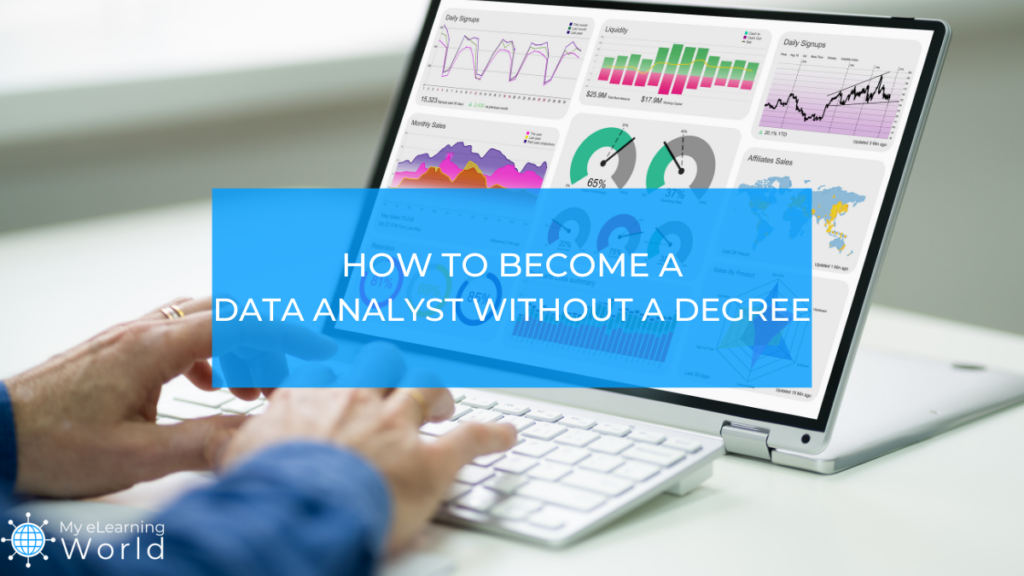Are you looking for practical, actionable tips on how to become a data analyst without a degree?
Data analysts are in high demand in today’s job market, as they can bring a lot of value to organizations by helping them make better decisions. According to a recent survey, 52% of businesses now consider data analytics and predictive analytics as primary components of their operations. Additionally, the global market for data analytics has seen significant growth, with a value of $211.83 billion in 2022, and is projected to eclipse $300 billion in 2023.
Data analysts are also well-paid. The median data analyst’s salary was over $82,000 in 2021, according to the Bureau of Labor Statistics), and as demand for qualified data analysts grows in coming years, that number is likely to only increase.
But what if you don’t have a degree in data analytics? Can you still become a data analyst?
The short answer is yes, with the best online learning platforms like Emeritus, you can get the world-class training you need to become a data analyst without a degree. However, it will likely take some time and effort to develop the skills necessary to be successful in the role.
Here’s everything you need to know about how to become a data analyst without a degree.
Disclosure: Some of the links in this article are affiliate links, meaning at no additional cost for you, we might get a commission if you click the link and purchase.
What is a Data Analyst?
First things first, what is a data analyst? Data analysts are responsible for collecting, cleaning, and organizing data so that it can be used to answer specific questions or solve specific problems. They use their findings to help organizations make better decisions.
Data analyst roles vary from organization to organization, but generally speaking, data analysts:
- Identify trends in data sets
- Develop hypotheses about how changes in data might impact the business
- Create charts, graphs, and other visual representations of data
- Conduct statistical analysis
- Write reports about their findings
To illustrate, imagine you’re hired as a data analyst by an advertising company. Some of your responsibilities might include analyzing customer data to identify spending patterns, understanding how changes in the economy might impact advertising budgets, and developing models to predict future customer behavior.
It’s also important to point out that there are differences between a data analyst and a data scientist.
While both disciplines work with data, they have different goals and focus areas.
Data analysis is primarily concerned with extracting insights from data to inform decision-making. It involves understanding the context of the data and using statistical methods to identify patterns and trends.
On the other hand, data science is a more holistic approach that combines statistical analysis, machine learning, and computer science to create predictive models and automate decision-making processes. It is focused on solving complex problems and discovering new insights from data.
Understanding the differences between these two disciplines is crucial for anyone looking to become a data analyst.
What Skills Do You Need to Become a Data Analyst Without a Degree?
Data analysts are skilled people. To be successful in the industry, certain skills need to come easily to you or need to be developed.
Here are the top skills needed to become a good data analyst:
- Technical skills: The first set of skills to possess are technical skills like mathematical knowledge, statistics, and coding. A data analyst needs to understand basic concepts like distributions, measures of central tendency, and correlation. Then, they should be able to use software programs to clean, organize, and analyze data. This might require learning SQL, Excel, and Tableau. In some cases, analysts will also need to know how to code in languages like Python to work with data on a more granular level. The most important technical skill for a data analyst is the ability to take data and turn it into insights that can be used to make decisions.
- Problem-solving. A major skill that data analysts use on a daily basis is problem-solving. A good data analyst knows how to take a complex problem and break it down into smaller, more manageable pieces. They also know how to think outside the box to come up with creative solutions. This skill is important because oftentimes, the data set that an analyst is working with will be incomplete or messy. In order to still be able to extract valuable insights from the data, analysts need to be creative in their problem-solving approach and have the ability to think critically.
- Communication. This is because data analysts often have to present their findings to non-technical people who might not be familiar with the concepts or the software programs being used. Therefore, it’s important for data analysts to be able to explain complex concepts in simple terms and to create visuals that can be easily understood by people who are not experts in the field.
- Collaboration. Data analysts also need to be good at collaborating with others. This is because data analysis is often a team effort and analysts need to be able to work well with others in order to get the job done. This might involve working with people from different departments within an organization, such as marketing, sales, and product development to name a few. An example is if you’re working on a project to develop a new marketing campaign, you’ll need to be able to work with the marketing team to get the data that you need and to ensure that your findings are incorporated into the final campaign.
A Step-by-Step Guide to Becoming a Data Analyst Without a Degree
Earning a degree in data analytics can easily cost over $100,000 and take 4 or more years to complete. This can be a significant investment of time and money.
What if you don’t have the resources for a traditional education? Or what if you simply want to carve out a different path for becoming a successful data analyst?
Here’s a step-by-step approach to breaking into the field without a degree:
1. Enroll in Online Courses
 Emeritus | Empowering Learners Globally | Online Courses
Emeritus | Empowering Learners Globally | Online Courses
Emeritus is the global leader in making world-class, professional education from top universities accessible and affordable for everyone. With online courses, bootcamps, degree programs, professional certificates, and senior executive programs, Emeritus helps individuals build in-demand, future-ready skills in a wide range of industries.
An online course can help you learn data analytics and build specific skills that you can use in your career pursuits.
There are many benefits to taking online courses.
For one, they are usually much more affordable than traditional college degree programs, but many offer the exact same level of quality, allowing you to learn from experienced data professionals and get certified.
Additionally, they can be completed in a shorter amount of time, which means that you can get started in your career much sooner.
Not only that, you can build the data skills you need to break into the industry from the comfort of your own home and on a flexible schedule that fits with your lifestyle. You can access courses from anywhere in the world, so you don’t need to be tied down to a physical classroom.
There are a variety of short courses that you can take to start your career in data analytics. These courses are offered by reputable online providers like Emeritus, a leading online learning platform that has partnered with more than 60 of the world’s top universities to deliver college-level courses in a more affordable and accessible format.
By taking a course on data analytics, you can gain the skills and knowledge needed to become proficient in areas such as data analysis, programming, machine learning, and more.
Using cutting-edge technology, revolutionary course material, and guidance from top-notch educators, Emeritus has empowered more than 250,000 learners across the globe to acquire the necessary expertise and competencies for lucrative occupations.
Upgrade your career by enrolling in their online courses and effortlessly gain the knowledge and proficiencies to become a data analyst in just a few months.
Emeritus boasts an exceptional selection of data analytics courses and certificate programs from some of the world’s most renowned institutions, including:
 Wharton Business Analytics Certification | Online Data Analytics Training Course
Wharton Business Analytics Certification | Online Data Analytics Training Course
Wharton's three-month online program equips managers and leaders with essential tools to gain a competitive edge in the business world by turning data into valuable insights. Don't miss out on this opportunity to build your data analysis skills.
 Business Analytics Online Course at Rotman | Online Certificate Program
Business Analytics Online Course at Rotman | Online Certificate Program
Enroll in this course to enhance your understanding of quality data and expert analytics, and leverage them to maximize your business value. Boost your data fluency today!
 NUS School of Computing: Analytics: From Data to Insights | Online Certificate Program
NUS School of Computing: Analytics: From Data to Insights | Online Certificate Program
Gain the knowledge and skills to effectively apply data analytics and Python methodologies to uncover critical business insights. This training program will provide you with the tools necessary to succeed in this rapidly growing field. Learn from experienced professionals and take your career to the next level.
Click here to explore everything Emeritus has to offer.
2. Get a Job in a Related Field
While taking courses is a great way to start your career in data analytics, it’s not the end of it. You should also get started in your career by getting a job in a related field.
There are many jobs that will give you the skills that you need to be successful in data analytics. Even a job in customer service or sales will teach you how to deal with people and how to collect data.
Jobs in marketing or market research will also give you exposure to data and how to analyze it.
The point is to get experience in a field that can help you understand and analyze data. This will give you an edge when it comes to understanding the data and being able to better interpret it.
3. Start Freelancing
Another great way to get started in your career is to start freelancing. Once you’ve gotten some training and earned a relevant certification, you can start putting your data analysis skills to work on a freelance basis.
There are many benefits to freelancing. For one, it allows you to get started in your career without having to find a full-time job. Additionally, it gives you the flexibility to work on projects that interest you.
To start freelancing as quickly as possible, you can sign up for a freelancing platform like Upwork or Fiverr to find jobs. Once you create a profile, you can start bidding on projects that clients have posted.
4. Create a Portfolio
One great way to show potential employers that you’re serious about a career in data analytics is to make a portfolio.
It’s a great way to showcase your skills and demonstrate what you’re capable of. To create a portfolio, you can use a platform like GitHub or WordPress. You can also create a website using HTML and CSS.
Once you have created your portfolio, be sure to include projects that you have worked on, as well as a description of the skills that you used.
Then, you can start to share your portfolio with hiring managers and recruiters to show them what you can do as you search for potential data analytics jobs.
5. Start Networking
Aside from finding jobs on freelancing sites, it’s important for aspiring data analysts to network with others in their field. Networking is an important part of any job search, and the data analytics field is no different.
You can do this by attending meetups or conferences related to data analytics, participating in online forums, or simply connecting with people on social media.
The benefits of networking with other skilled data analysts are numerous. You can learn about new opportunities, receive valuable feedback on your work, and make connections that can advance your career as a data analyst.
When networking with other skilled data analysts, it’s important to focus on building relationships rather than just promoting yourself. Show that you’re interested in collaborating and learning from others, rather than being solely focused on finding a job. By doing so, you’ll be more likely to form meaningful and beneficial connections in the data analytics community.
Tips for Landing Your First Data Analytics Job
Once you’ve got all the training and hands-on experience you can, it’s time to try to land a data analysis role with an employer.
Here are some tips to help you land your first entry-level data analyst job:
- Build an online presence–Showcase your skills and experience on social media and other online platforms. You might even want to launch your own personal website. Ensure that your online presence reflects your strengths as a data scientist.
- Craft a great resume–A strong resume can make all the difference. Highlight your education/training and successful projects you’ve completed. Be sure to include details about the tools and techniques you used. Tailor your resume around keywords and attributes that employers are looking for in their job listings.
- Be prepared to ace your interview–Practice answering questions related to data analysis, and make sure you can explain your thought. Present yourself as someone who is eager to learn, grow and take on challenges.
A Final Word on Becoming a Data Analyst without a Degree
Data analysts are important parts of any company. They help make decisions by analyzing data and finding trends.
With the ever-growing demand for data analysts, there has never been a better time to get on the data analyst career path. While a degree is not required, taking online courses and building a portfolio are great ways to get started.
Additionally, networking is important if you want to be successful in this field.
By following these tips, you can start your career in data analytics without a degree
Do you have any questions on how to become a data analyst without a degree? Let us know in the comments below!


